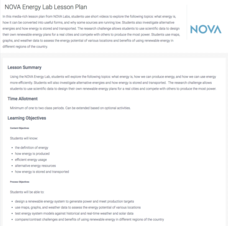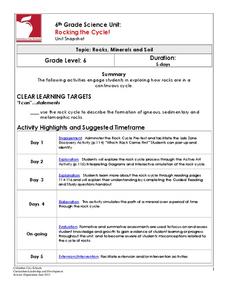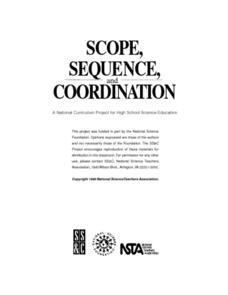PBS
NOVA Energy Lab Lesson Plan
Can our energy resources keep up with our ever-growing population? Science scholars learn the basics of energy and Earth's energy resources during an electrifying lesson. The resource combines video clips and an engineering design...
Earth Day Network
Staying Green While Being Clean
Clean up the environment with a lesson that focuses on replacing hazardous cleaning supplies with green, environmentally-friendly products. Using a dirty patch of surface as a control area, kids clean other parts of various surfaces...
Howard Hughes Medical Institute
Human Impacts on Biodiversity
Have you always wanted to take your science class on an amazing field trip they will never forget? Now you can! Observe the wildlife in an African savanna through trail cameras with a five-part data analysis activity. Learners analyze...
Royal Society of Chemistry
Green Plastics—Chemistry Outreach
How do green plastics reduce waste and environmental pollution? Budding scientists create and test a variety of compounds used in green plastics during an insightful experiment. Beginning with startling statistics and ending with...
Howard Hughes Medical Institute
Got Lactase? The Co-Evolution of Genes and Culture
Does the human body evolve as quickly as human culture? With a stellar 15-minute video, explore the trait of lactose intolerance. Only about 1/3 of human adults seem to still have the enzyme lactase and therefore, the ability to digest...
Howard Hughes Medical Institute
The Making of the Fittest: The Birth and Death of Genes
Adaptations must be made as environments change. This fabulous presentation features Icelandic icefish, a transparent, scaleless specimen that even has colorless blood. Genetics and adaptations concepts are explored as scientists study...
American Physiological Society
Drug the Water Flea
This is a flea. This is a flea on drugs. Any questions? Your class will have questions aplenty during an impactful experiment. Lab groups get to know Daphnia magna, the humble water flea, and study the effects of stimulants and...
Kenan Fellows
The Little Stuff Can Make a Big Difference
Great things come in small packages! What better way to illustrate this point than a week-long look at nanotechnology? Earth science scholars explore water quality issues through lab activities, then research new innovations in nanotech...
NOAA
Stressed Out!
Are our oceans really suffering due to the choices humans make? The sixth and final installment in the volume of activities challenges research groups to tackle one of six major topics that impact ocean health. After getting to the...
Columbus City Schools
Sedimentary Rocks
Turn your class discussion of rock formation from ho-hum to holy hornfels! Junior geologists gain experience in identifying rock types and rock origins, with an emphasis in hypothesizing the environment needed to form certain rocks. The...
Columbus City Schools
Thinking Like A Soil Scientist
Ready to roll up those sleeves and get your hands dirty? Dirty with soil science content, that is! Overcome those "But it's just dirt" objections with a trip outside to collect soil samples for some in-class analysis. Use the variety of...
Science 4 Inquiry
Enzymes in Action
Enzymes play a role in almost every function in the human body. Scholars explore three variables related to the use of enzymes. They observe a catalase reaction, experiment with substrates, and examine reactions rates.
Curated OER
Food Safety Lab-Part 3 Cross Contamination andHygiene
Students observe the effect of croos contamination as they inoculate orange juice with penicillin mold from the refrigeration lab and active yeast solution from the sterilization lab. They experience a simulation of passing bacteria...
Colorado State University
How Can You Demonstrate the Different Efficiencies of Different Light Bulbs?
Need a bright idea for an engaging lab? Watch your class light up as they explore the difference in efficiency between incandescent and LED bulbs! The resource makes use of simple materials and encourages learners to infer what's...
Columbus City Schools
Rocking the Cycle!
Time to rock out! Discover the "life" cycle of the average rock using an illustrative stations lab and stimulating pairs game. Roll the dice to determine your fate: will it be melting in magma or chilling out to form igneous rock? The...
Virginia Department of Education
Safety and the Material Safety Data Sheet
While many chemicals are used in biology class, many pupils don't understand the material safety data sheets. The lesson explains each part and the importance of understanding the forms. Young scientists use safety equipment to ensure...
Curated OER
Digital Video Lesson Plan: Brine Shrimp
Middle schoolers participate in classroom experiment to gain better understanding of type of environment brine shrimp can best survive. Students then explore effects of common saltwater pollutants on survival of animals in sea.
Curated OER
Hazards: Third Grade Lesson Plans and Activities
Learners discover hazards related to volcanoes and predict the effects these hazards have on people and land. As blossoming geologists explore various volcanic eruptions, including the hazards associated with them, they create their own...
Columbus City Schools
The Mystery of Earth’s History
Every living creature can leave a fossil record, yet most fossils belong to extinct organisms rather than ones currently living. Scholars learn about dating rock layers, fossils, and the environment of the past. Pupils understand that...
Polar Trec
Animal Monitoring Introduction
Not only do mealworms taste great, they are also great for classroom science lessons. In pairs, young scientists observe and record what they see as they check out what their mealworms are doing from minute to minute. Each minute...
Curated OER
Variations in Living Things
Biology beginners observe traits in a collection of plant parts to realize the tremendous amount of genetic variation within a species. They consider rules of nature and discuss what would happen if they changed. They also examine data...
Columbus City Schools
Photosynthesis and Respiration
Thirty percent of the world's oxygen is produced by rainforests found throughout the world. Seventh grade learners explore the processes of photosynthesis and respiration through 10 days of labs, manipulatives, and discussions. They...
Curated OER
Biocomplexity Lab Activity: Measuring Water pH
Students test unknown solutions for pH levels to determine which organism can live in each environment. They name three substances that they think are acids. Students determine a solution is an acid or base. They define the term pH.
Curated OER
Plankton in the Air
Here is a lab activity adequate for use with any full lesson plan on environmental factors that shape animal adaptations or marine animal characteristics. Pupils will discuss the role plankton plays in the environment and filter-feeding...

























